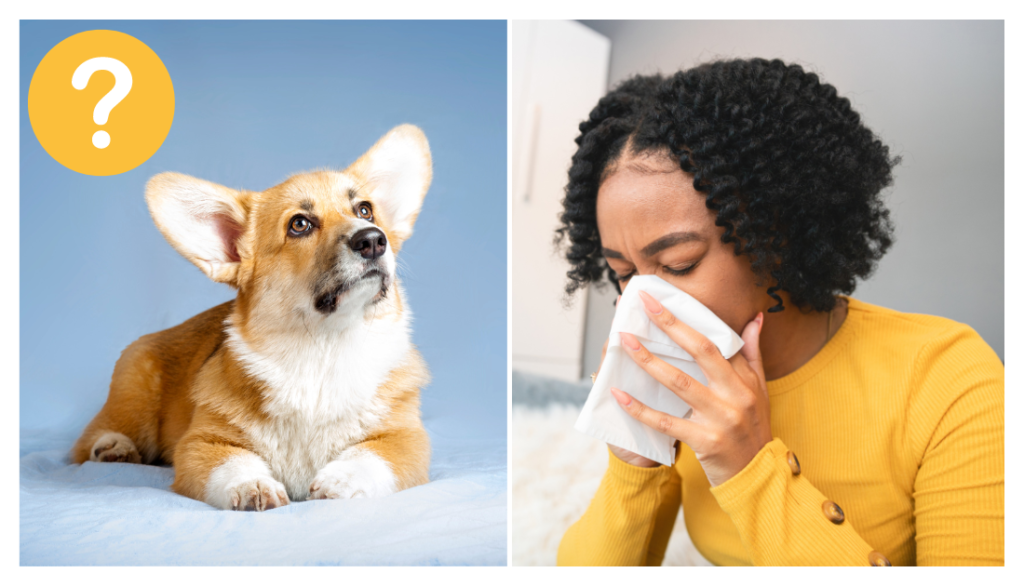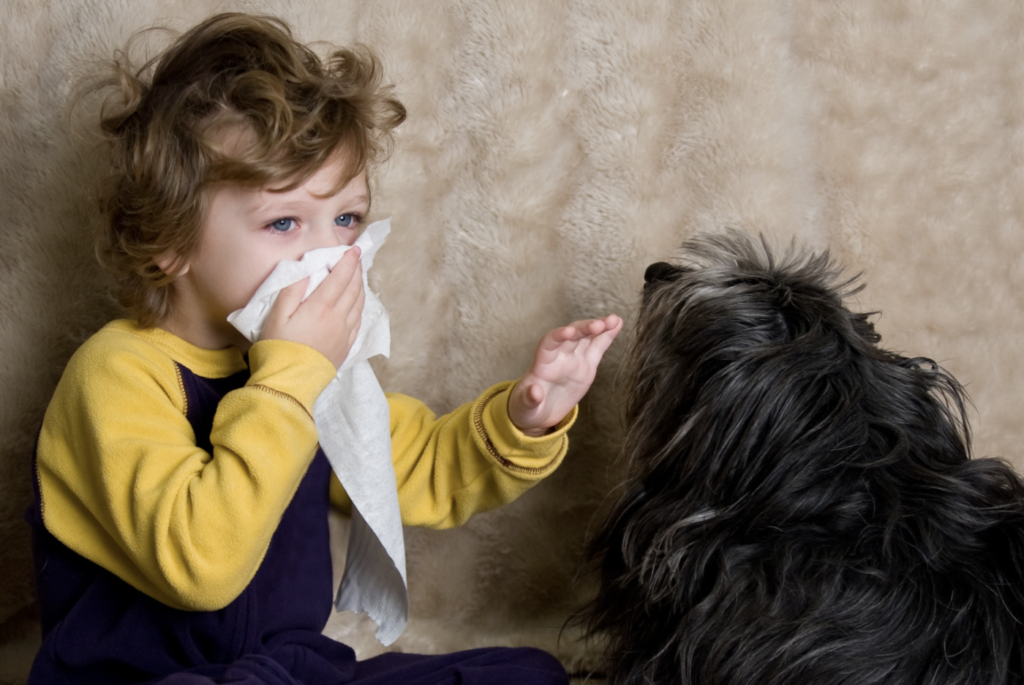Are Corgis Hypoallergenic? The Truth About Corgis and Allergies

Corgis are energetic dogs that make great pets, but for people who suffer from pet allergies, these features aren’t the only pieces of information needed to decide whether a corgi is the right pet for their household.
Plenty of people ask whether corgis are hypoallergenic, and while the short answer is no, it’s a good idea to learn more about pet allergies. This way, you can determine whether owning a corgi is still a possibility if you’re allergic to dogs.

What does hypoallergenic mean?
When people with allergies tend to have allergic reactions to pets, the reaction isn’t entirely due to the animal’s fur. Instead, pet allergies come from proteins that are found in an animal’s fur, urine, or saliva. Pet fur simply collects these proteins, as well as other allergens like pollen or dust mites.
The term “hypoallergenic” technically means something that is below average in terms of causing allergic reactions. A hypoallergenic dog tends to produce fewer allergy-inducing proteins, which triggers fewer allergic reactions in people who are allergic to dogs.
Are hypoallergenic dogs legitimate?
In short, yes. There is legitimately such a thing as a hypoallergenic breed of dog. However, it’s important to understand that no dog breed, and no dog within a specific breed, is 100% free from allergy-producing proteins.
Some dog breeds tend to produce and/or shed fewer allergens than other breeds, which makes them hypoallergenic or below average by allergy production standards.
Allergy-Triggering Factors
Like any allergy, pet allergies are triggered when an individual has been exposed to an irritant that their body reacts to abnormally. When it comes to pet allergies, they’re most often triggered by protein cells that are found in the animal’s skin or on the animal’s fur.
Allergies can also come from dog saliva or urine, though, as the allergy-inducing proteins are found in these substances as well.
Which dog breeds are the most hypoallergenic?

According to the American Kennel Club, the most hypoallergenic dog breeds include:
- Afghan Hound
- American Hairless Terrier
- Bedlington Terrier
- Bichon Frise
- Chinese Crested
- Maltese
- Poodle
- Schnauzer
- Xoloitzcuintli
- Yorkshire Terrier
Here’s a compreshenisve list of 55 of the best breeds for people with allergies
Which dog breeds are the least hypoallergenic?
Whether it’s due to excessive shedding, saliva production, dander, or difficulty with house training, these are a few of the least hypoallergenic dog breeds.
- Boston Terrier
- Bulldog
- German Shepherd
- Pekingese
- Saint Bernard
Are corgis hypoallergenic?
Corgis are not one of the most hypoallergenic dog breeds, nor are they one of the least hypoallergenic dog breeds. Yet, because each person has unique triggers, asking “are corgis hypoallergenic dogs” can be difficult to answer. Several factors contribute to whether these dogs will or will not irritate a dog owner’s allergies.
Corgis tend to shed a lot, but their fur lacks fulminating dander, which is an irritant that many people react to when they have dog-related allergies. However, corgis also shed skin particles regularly, and dead skin cells can also trigger a person’s allergy responses. Want to know more about Corgi shedding?
For individuals who are allergic to some dog breeds, it may be wise to introduce yourself to a corgi slowly so that you can gauge your reaction and prevent a serious allergy attack.
It’s worth noting that some corgis shed less than others, so they might be a better choice for allergy sufferers who worry about pet dander.
Purebred corgis like the Pembroke Welsh Corgi or the Cardigan Welsh Corgi will likely produce more allergens than corgi mixes, such as mixed breeds with corgi and schnauzer parentage.
Tips for Dog Owners with Allergies

Having pet allergies doesn’t always mean that you can’t have a dog at home, so if you’re an allergy sufferer but you want to keep a dog in your house, you might be able to. Follow these tips to reduce pet dander and prevent allergic reactions from creeping up on you.
- Regular Grooming: Keeping up with your dog’s hygiene can help reduce the volume of dead skin cells and fur your dog sheds. Make sure that your pet has a bath fairly often and brush him or her as often as needed to get rid of loose fur. Want to know how often you should bathe your pet? Take this short quiz.
- Medical Supplements: Allergy shots or antihistamines might reduce your reaction to pet allergens.
- Air Filters: Use air filters at home, and regularly wash your pet’s bedding. Additionally, vacuum carpets and clean upholstery on a regular basis. Anything that can be thrown into the washing machine should be cleaned once a week or so.
- Pet-Free Areas: Keep an area in your home that’s off-limits for your pets. This way, if your allergies start acting up, you have a clean, pet-free room to retire to when you need to recover.
- Do Not Sleep With Your Dog. As tempting as it may be, if you have allergies, having your dog in your bed is one of the worst ideas.
FAQ
Are corgis low-maintenance?
Corgis are relatively low-maintenance dogs, but they do have a thick double coat that will need to be groomed regularly.
How much do corgis shed?
Because of their double coat, corgis shed quite heavily, especially during peak shedding times throughout the year.
Are corgi puppies hypoallergenic?
Corgi puppies don’t shed as much as adult corgis, but calling them hypoallergenic would be inaccurate, especially because puppies don’t stay young forever. They shed more and more as they grow.
Are welsh corgis hypoallergenic?
No. Welsh Corgis and other purebred corgis tend to be less hypoallergenic than mixed breeds. If you want to be a corgi owner and you have allergies, a corgi mix might be the best option.
How can I reduce my corgi’s shedding?
In addition to regularly bathing, brushing, and otherwise grooming your dog, you could try applying Allerpet or some other brand of allergy-reduction liquid product. After a bath, apply a bit of the product to your pet’s fur or skin. Want to know how often you should bathe your pet? Take this short quiz.
In addition, it’s a good idea to ensure that you’re feeding your dog a healthy diet that helps promote healthy skin and maintain a clean, full coat.
Can allergens affect my dog?
Yes. On top of causing allergic reactions in humans, certain allergens that get trapped in your pet’s fur can cause them to have allergic responses as well. For example, if your corgi has dust mites in his fur or he has built up a large number of dead skin cells that have not shed, he might be more itchy than usual, and you might notice drier, flakier skin near the areas he’s able to scratch.
Owning a dog when you have allergies takes work, and you’ll likely find yourself cleaning your home more often than you have in the past to remove dander. You might need an occasional over-the-counter allergy supplement as well. Yet, for many dog owners, having a happy, friendly, fun-loving pet is worth the time and energy invested into reducing allergy triggers in your home.
Research your options and try testing your allergic response when near corgis before you commit to bringing one of these dogs home with you.
Related Posts
- How Much do Corgis Shed? A Guide to Corgi Shedding and Management
- 4 Best Dog Food Brands for Corgis & Corgi Puppies
- Cardigan Welsh Corgi vs. Pembroke Welsh Corgi: What’s The Difference?
- Your Guide To The Best Dog Shampoos
- 55 Hypoallergenic Dog Breeds You Might Be Able To Live With If You Have Allergies
